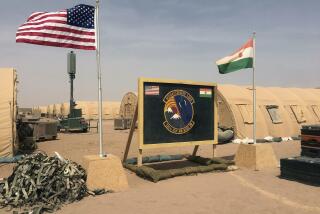U.S. Willing to Provide Troops to Aid a Pullout
- Share via
WASHINGTON — The Clinton Administration has agreed in principle to send U.S. troops to help evacuate U.N. peacekeeping forces from Bosnia if the United Nations or the European allies ever request such help, U.S. officials said Wednesday.
The decision, made earlier this week by the President’s top national security advisers, is expected to be conveyed to the European allies by Secretary of State Warren Christopher at a meeting today of the North Atlantic Treaty Organization in Brussels.
U.S. officials stressed that the United States has not yet received a request to help evacuate U.N. peacekeeping troops, and policy-makers said they see little prospect that the United Nations will actually decide to withdraw its forces any time soon.
They also insisted that the Pentagon has not yet completed plans for evacuating the U.N. forces, which now include about 24,000 British, French, Canadian and other troops.
“I am not aware of any contingency plan,” Defense Secretary William J. Perry said.
But White House officials said top presidential advisers have agreed in principle--with President Clinton’s informal concurrence--that the United States would participate in a multinational effort to evacuate.
Although U.S. officials said no details are yet available, outside military analysts speculated that the operation could require 4,000 U.S. ground troops and dozens of NATO warplanes to provide air cover.
It was not immediately clear whether such an operation would include about 2,000 Marines now aboard a Navy helicopter carrier in the Adriatic Sea off the Bosnian coast. The warship was sent to the region over the weekend to rescue NATO pilots or U.N. forces if they got into trouble.
The decision to assure NATO in advance that U.S. forces will help in any evacuation was intended to assuage the allies, who have been critical of U.S. policy--particularly after Clinton announced that U.S. forces no longer will enforce an arms ban against Bosnian Muslims.
The Administration had promised the United Nations and the allies months ago that it would consider any formal request to help in extracting U.N. peacekeeping forces, but it has not yet indicated officially that it is willing to do so.
U.S. officials said Wednesday that the decision to accommodate a U.N. or allied request for help is contingent on U.S. approval of operational details and consultations with Congress.
Even so, the move, which would mark the first time U.S. ground troops would set foot in Bosnia, could prove controversial at home. Congressional Republicans have warned that they will push to block any attempt to use U.S. ground troops in Bosnia.
Senate Republican leader Bob Dole of Kansas, wrapping up a trip to NATO headquarters Wednesday, used a series of television interviews to attack NATO, the United Nations and what he called U.S. acquiescence to Europe’s Bosnia policy.
“We’ve been following the European plan for the last two years,” Dole said, asserting it has produced 200,000 deaths and no negotiated solution. “It’s time for a new option.”
Military experts said the job of evacuating U.N. peacekeeping forces from Bosnia could be difficult and potentially risky, depending on conditions imposed by the combatants, the Serb nationalist forces and the largely Muslim Bosnian government.
U.S. officials said they would hope to negotiate a “permissive withdrawal,” under which the U.N. forces would be allowed to travel unharassed to airplanes and to seaports. U.S. forces would provide security and sea and air transportation.
However, if either the Serbs or the Muslims decided to challenge the U.N. forces militarily, the United States and its NATO allies could be forced to evacuate the U.N. units under combat conditions, requiring a heavily armed force that would fight its way in and out.
Analysts familiar with military thinking on the issue said that could require at least 4,000 ground troops and as many as 15,000. It would also require massive air strikes by NATO warplanes to knock out Serbian missiles and artillery.
Gen. John M. Shalikashvili, chairman of the Joint Chiefs of Staff, told reporters Wednesday that evacuating the U.N. troops from Bosnia would require “a significant force. (It is) something that is not done with just a handful of forces.”
Strategists said the evacuation could be a drawn-out operation. Kofi Annan, the U.N.’s top peacekeeping official, told reporters Monday that a full-fledged evacuation would take at least 165 days, and some analysts said it could require almost a year.
Much would depend on whether the Serb nationalists and Muslims posed a threat to U.N. and U.S. troops--either out of longstanding anger at their intervention or resentment at their pulling out--and whether the peacekeepers were allowed to travel to airfields or seaports.
The assurances to the allies marked the latest in a series of such steps that the Administration has taken in an effort to heal the rift in NATO that has followed the U.S. decision to stop enforcing the U.N. arms embargo against the Muslims.
Senior U.S. officials disclosed Monday that the Administration had agreed to suspend its longstanding calls for more NATO air strikes and instead back a European proposal to allow the nationalists to form a federation with Yugoslavia if they accept a U.N. peace plan.
More to Read
Sign up for Essential California
The most important California stories and recommendations in your inbox every morning.
You may occasionally receive promotional content from the Los Angeles Times.










